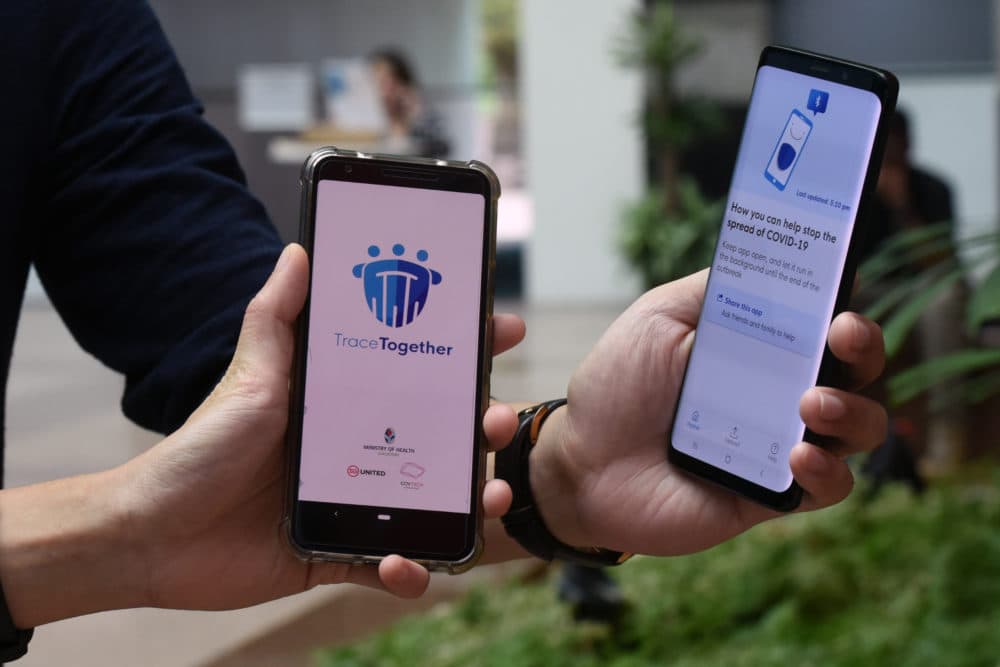Advertisement
Lessons From Singapore, Hong Kong And South Korea's Response To Coronavirus
Resume
Singapore, Hong Kong and South Korea seem to be getting it right when it comes to coronavirus. We’ll take a close look at what they’re doing, how they’re doing it and if those measures can be deployed in the United States.
Guests
Dale Fisher, chair of infection control at the National University Hospital at the National University of Singapore.
Claire Standley, assistant research professor with the Center for Global Health Science and Security at Georgetown University. (@ClaireJStandley)
Gabriel Leung, dean of medicine at the University of Hong Kong. Infectious disease epidemiologist. Founding director of the WHO Collaborating Center for Infectious Disease Epidemiology and Control. (@gmleunghku)
Andrea Crisanti, an infections expert at Imperial College London. He's on sabbatical at the University of Padua in Italy.
From The Reading List
The Guardian: "In one Italian town, we showed mass testing could eradicate the coronavirus" — "It’s now about one month since Covid-19 began to sweep across Italy. With more than total cases topping 40,000 as of 19 March, it is now the worst-affected country outside of China.
"But in the last two weeks, a promising pilot study here has produced results that may be instructive for other countries trying to control coronavirus. Beginning on 6 March , along with researchers at the University of Padua and the Red Cross, we tested all residents of Vò, a town of 3,000 inhabitants near Venice – including those who did not have symptoms.
"This allowed us to quarantine people before they showed signs of infection and stop the further spread of coronavirus. In this way, we eradicated coronavirus in under 14 days."
The Conversation: "Why Singapore’s coronavirus response worked – and what we can all learn" — "Singapore’s response to the coronavirus has been held up by many around the world as a model. ... The first thing that helped with its response was it was ready before the outbreak even occurred because of the SARS outbreak of 2002-03.
"It was aware then that its infrastructure wasn’t ready for an outbreak of this kind. So, in the years since, isolation hospitals were built, more negative pressure rooms were created and legislation was put in place.
"Then, on December 31, when the world first became aware of coronavirus in China, Singapore started to get prepared. By the time the World Health Organisation declared a public health emergency at the end of January, it was ready."
STAT News: "What Singapore can teach the U.S. about responding to Covid-19" — "Our country, Singapore, has managed to contain the spread of the SARS-CoV-2 virus within its borders, as have mainland China, Taiwan, Hong Kong, and South Korea.
"Commonalities of these successful responses include extensive preparation in the wake of the severe acute respiratory syndrome (SARS) outbreak in 2003, aggressive testing and transparent case reporting to both domestic and international stakeholders, swift and decisive interventions to promote or impose social distancing, and frequent and consistent public health communications. Singapore was one of the earliest countries to detect Covid-19 and in early February was near the top of the confirmed cases list by territory.
"Yet there has been no exponential rise in cases to date. Some of the reasons for these are unique to the Singapore system, which invested heavily in outbreak preparation and building health care infrastructure capacity building after the SARS wake-up call. Others, however, offer more broadly generalizable lessons that we have learned at the disease level as well as at the community, health system, and national levels."
This program aired on March 25, 2020.

